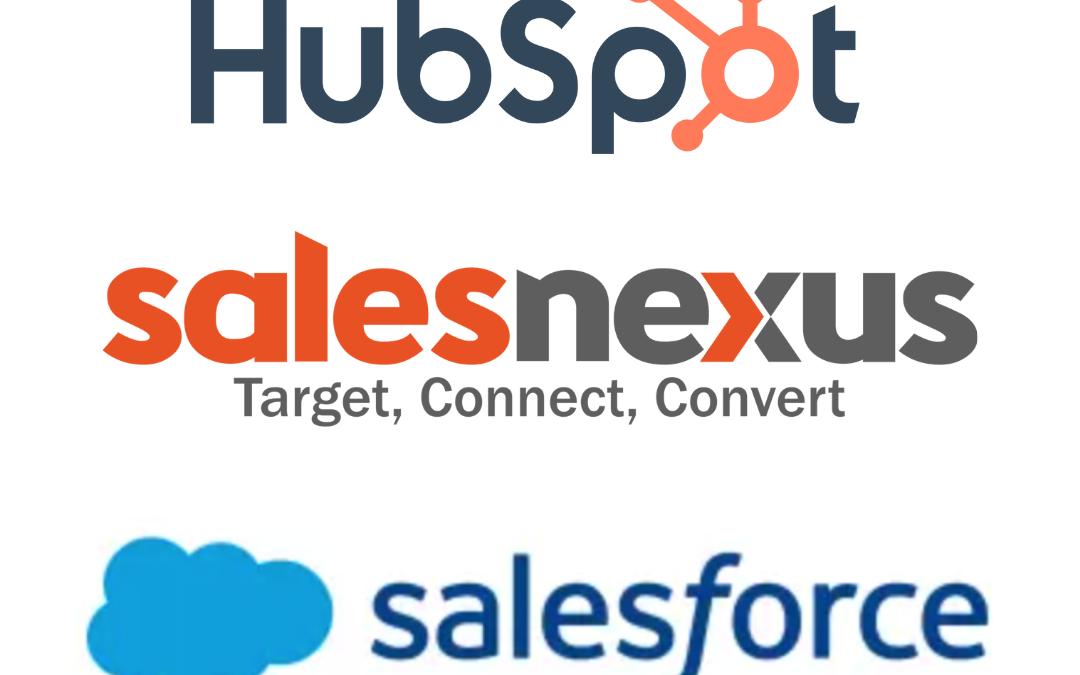This comparison article results from rigorous tests and analysis of the three major CRM software combined with publicly available reviews.
It clearly answers which CRM you should choose from: HubSpot vs. Salesforce vs. SalesNexus trilemma based on your company size, goals, and budget.
At a glance, all three are comprehensive CRMs addressing the key needs of sellers. But when it comes to how each one does it, the devil lies in the details.
While HubSpot attracts salespeople with unparalleled user experience and convenient integrations, Salesforce’s scalability stands out. In the same vein, SalesNexus wins the battle as the most sales-oriented CRM with robust reporting tools and sales pipeline management capabilities.
Without further ado, let’s discuss…
- A brief overview of HubSpot competitors
- Is HubSpot better than Salesforce or SalesNexus?
- Salesforce comparison with others in terms of scalability and enterprise-level support
- Sales funnel management, tracking & analytics, drip campaigns, customer support and other features of each platform
HubSpot vs. Salesforce vs. SalesNexus: Brief Overview
| PLATFORM FEATURES | HUBSPOT | SALESFORCE | SALESNEXUS |
| Initially Sales-Oriented | ✖ | ✖ | ✓ |
| Enterprise-Level Support | ✖ | $ | ✓ |
| Automatic Contact Enrichment | ✖ | ✖ | ✓ |
| Better for Small and Middle-Sized Businesses | ✓ | ✖ | ✓ |
| 24/7 Customer Support | ✓ | ✓ | ✓ |
| Third-Party Integrations | ✓ | ✓ | ✓ |
| Sales Pipeline Management | ✓ | ✓ | ✓ |
| Lead Scoring | ✓ | ✓ | ✓ |
| Leads’ List Cleaning | ✖ | ✖ | ✓ |
| Automated Drip Campaigns | ✓ | ✓ | ✓ |
Each of these CRMs has its unique strengths and a set of advantages. That mainly depends on the brand goals, interface design, and core functionality.
The common notion is that HubSpot is best for inbound marketing and lead generation, while Salesforce is for established businesses looking for scalability in many directions – above narrow marketing and sales focus.
SalesNexus was initially designed for sales teams. Its marketing automation tools are driven by sales interactions. So, if your primary concern is sales, this platform is the best alternative to HubSpot, which gives you maximum control over customer relationships.

It’s also crucial to note that HubSpot and SalesNexus were mostly built on one code base. This results in a friendlier user experience and fewer issues regarding integration with third-party software.
On the contrary, the history of Salesforce is rich with many acquisitions where the platform was built together from different pieces. As a result, Salesforce may have a steeper learning curve due to its large scale and require more admin support.
Wanna zoom in on each CRM solution?
SalesNexus: The Most Cost-Effective CRM
For those interested in a CRM alternative to HubSpot that is narrowly specialized in sellers’ needs, SalesNexus is the best pick. While it offers marketing automation features, such as lead nurturing and segmentation, its primary focus lies squarely in sales.
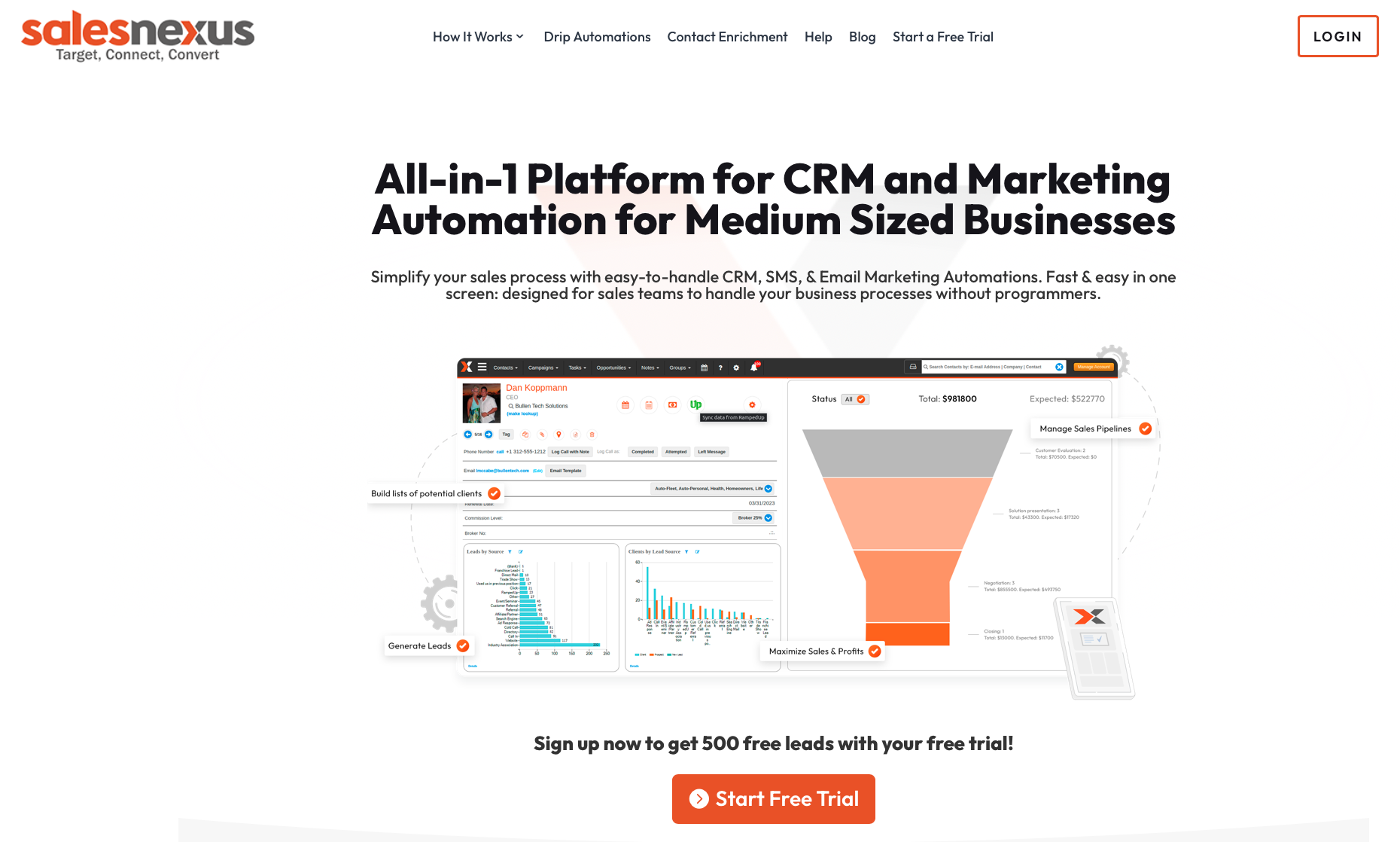
It provides you with everything the sales crew needs to boost their performance. One can seamlessly organize prospect information, overview the sales pipeline and run automated email campaigns with a few clicks.
What’s more, SalesNexus is an effective research tool, helping you to enrich lead profiles with every data you need automatically. Once the lead is added to your SalesNexus CRM, the system can fill in their title, company, phone number, email address, and even such details as monthly revenue. Moreover, the Enrich feature is already available with the subscription plan, meaning you don’t have to pay extra cash.
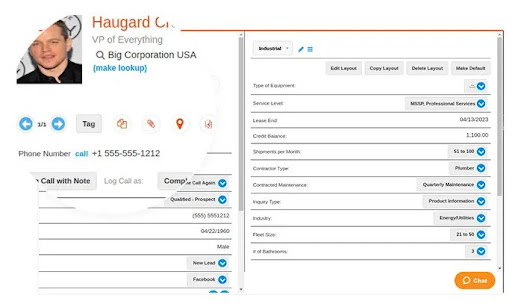
Further, you can use that data to build targeted lists of prospects and run email campaigns to reach those leads on a micro-level. The automated system can help you follow up on contacts, schedule calls and meetings, analyze and track the performance of campaigns, etc.
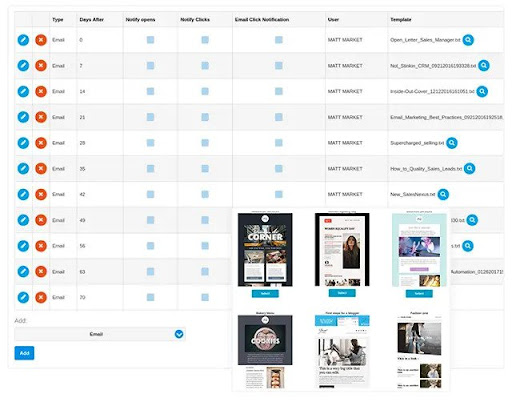
In the HubSpot vs. Salesforce vs. SalesNexus battle, the latter best fits small and medium-sized businesses.
Firstly, it’s one of the most cost-effective yet powerful CRMs. Trusted by 2,000+ businesses worldwide, SalesNexus is among the pricing/provided value ratio winners.
Secondly, it’s easy to install and use without the help of professional developers or admins. The platform’s customer support team is available 24/7 and ready to help you set up the system or solve any issues. Anyways, the setup issues are hardly likely to arise due to the intuitive and user-friendly UI.
HubSpot
Here we go with HubSpot – one of the most renowned cloud-based customer relationship management platforms. At a rough glance, HubSpot combines sales, marketing, customer service, and content management software into one unified platform. And it does it quite well, as customers widely acclaim the platform’s ease of use.

HubSpot is often credited for its user-friendly interface. The platform continuously enhances the user experience for admins, reps and managers. The goal is to make customers spend less resources when switching to HubSpot.
When it comes to sales and marketing automation, HubSpot shines with a wide range of options, from contact management and email tracking to custom landing pages and automated customer segmentation. It features email templates, automated meeting scheduling, outreach sequences, and other features to help reps become more productive and efficient.
Why do we refer to such a feature-packed and multidimensional tool as a mostly marketing-focused platform?
That’s because initially, when created in 2005, HubSpot was a pure resource for marketers. Its original purpose was to help marketers organize and nurture their leads using unique insights and pain points. When the leads were ready to pass to the next stage of the sales pipeline, early HubSpot users just transferred them to the sales crew.
Now, the complete cycle – from inbound marketing and lead qualification to sales and customer service – is within HubSpot’s capabilities. But it still stands out for its comprehensive marketing features, such as website hosting, blogging, social media scheduling and posting, email marketing, and more!
SalesForce
When we compare Salesforce vs. HubSpot, it’s quite an equal combat. Both have a wide range of features. Both started as basic contact management systems and expanded to offer more automation tools and customer support.
The key difference here lies in the scope of their capabilities. Salesforce was designed for large-scale enterprises. Thus it has a broader range of tools than HubSpot, and it is able to process large data volumes.

Plus, enterprise-level customization and scalability options allow you to tailor the system to your specific needs.
One may find the most advanced business management tools in Salesforce. It’s a centralized hub for contact management, analytics, sales pipeline management, forecasting, eCommerce, customer service and more.
Basically, anything needed for businesses of any size, from small to large, is here. However, just as rich features are a benefit, they can also be an issue. Using this system is best if you have tech-savvy admins who can manage the customization and integrations with other software solutions.
It’s also worth noting that Salesforce may cause you some slowdown when scaling or applying advanced customization. As it has grown through acquisitions like Pardot, it provides a less integrated user experience than HubSpot or SalesNexus.
So, if you run a small business, Salesforce might be an overkill. But large enterprises must have all the features in one place – and that’s what Salesforce offers. Added to Salesforce’s robust AppExchange (the largest CRM app marketplace) with around 3,400 apps and integrations, it’s an easily sustainable system for businesses of any size.
Is Hubspot Better Than Salesforce and SalesNexus? Let’s Find Out!
In the HubSpot vs. Salesforce battle, it’s not easy to decide who will be the winner. HubSpot is a leader in user-friendliness, simplicity, and setup speed.
But HubSpot will significantly limit you when it comes to larger data sets, scalability, and customization options.
SalesNexus is for a completely different type of user, and it’s the best choice for small businesses looking to boost sales. With no need for lengthy development or customization, it’s a cost-effective, easy-to-use solution focusing on sales.

Let’s make a HubSpot CRM vs. Salesforce vs. SalesNexus comparison at a feature level.
Sales Funnel Overview
SalesNexus is the simplest and the most convenient for sales funnel overview. It provides users with an interactive sales pipeline, allowing them to easily move leads around and assess their progress in real-time.
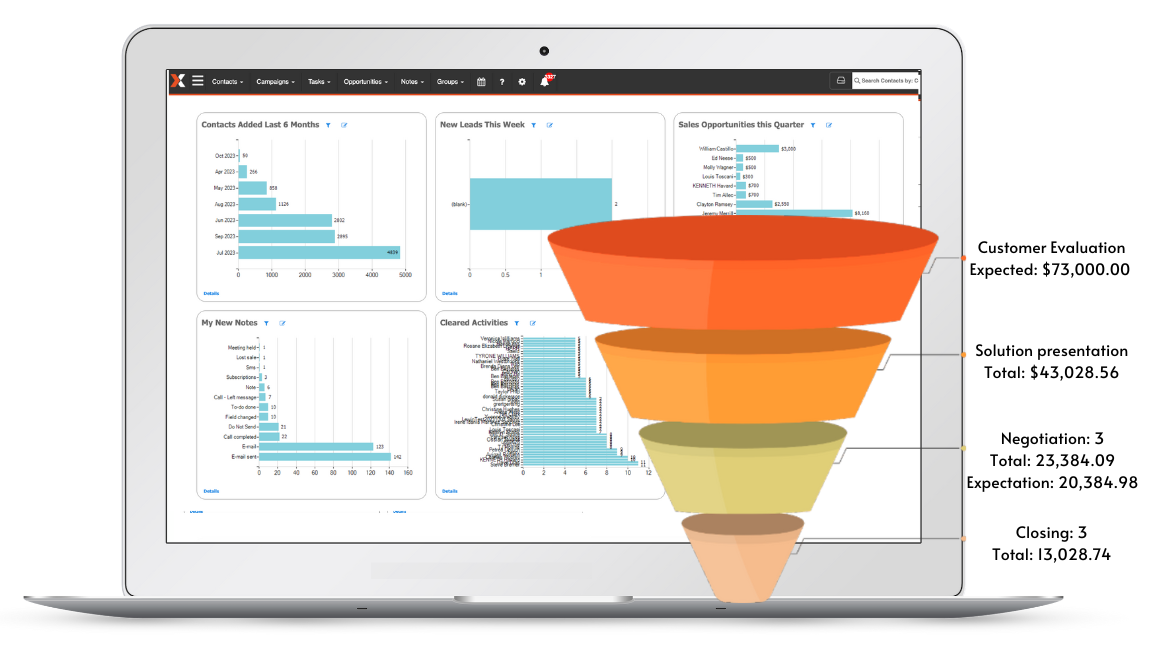
In an attractive, visual format, users can watch the sales funnel evolve from suspects to customers. You can easily track where each lead is in the funnel and set up customized workflows to nurture each lead with a personalized approach.
You can also create leaderboards and sales activity reports for a quick snapshot of the team’s performance.

HubSpot and Salesforce come hand-in-hand with sales pipeline management. Salesforce is a stronger customization tool for creating dashboards, sales reports, and alerts. This system helps you to identify bottlenecks in the sales process, improve your sales team’s performance and measure its success.
HubSpot is notable for its ability to customize lead stages for multiple pipelines, as no two sales funnels are the same. This means different sales departments can have their own pipelines and track them separately without interference from other departments.
Lead Management
When looking at lead management features, there are no big differences between HubSpot vs. Salesforce. We love both tools’ advanced lead scoring systems, allowing sales reps to understand which leads are the most qualified and who have higher conversion chances.
In Salesforce, the software uses various customer fit criteria to assess the scores. User feedback shows these estimates are quite accurate in predicting possible conversion outcomes.
In HubSpot, you can assign lead scores or let the system do it using each lead’s historical data. Once all leads are scored, you can assign your sales team with workflows to follow up on leads with the highest scores.
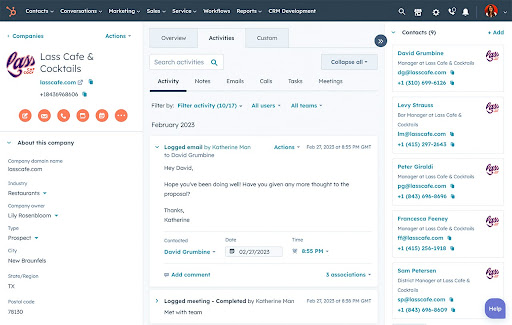
So, what about SalesNexus? It’s a great helping hand when sourcing the contact data of leads. All prospect data is extracted from LinkedIn, and the regular scan for LinkedIn updates is running to ensure you always have verified contact methods for each prospect.
SalesNexus also has a list-cleaning functionality, which helps filter out useless information and focus on quality leads only. With clean data, you run more effective automatic campaigns with better email delivery rates and fewer spam complaints.
Automatic lead nurturing in SalesNexus sends personalized and highly-customized messages to each lead on your list, boosting overall engagement levels and bringing more leads through the funnel.
Tracking & Analytics
Which alternative to HubSpot provides a more transparent tracking and analytics system?
SalesNexus has an interactive dashboard that allows you to track and analyze all customer interactions with your business across multiple channels. It also provides you with a real-time overview of your sales performance, which can be helpful when trying to understand what works and what doesn’t.
The best part of the SalesNexus tracking system is simplicity. The reports are not overloaded with unnecessary data or complex structure -just enough to get the bigger picture.

Salesforce comes with a more advanced, AI-powered reporting system, which is proportional to the huge amount of data the system allows users to store. The AI assistant of Salesforce- Einstein, runs predictive analytics and forecasts sales trends for you.
This alternative to HubSpot also offers real-time sales analytics, customer segmentation and trend analysis. Together, they provide a full picture of customers, which can be extremely helpful when understanding customer behavior.
Finally, HubSpot is in the middle between its two competitors. It goes beyond basic reporting and provides insights into website activity, individual email performance, sales forecasting, etc. However, most of its robust analytics tools are available only for enterprise-level customers.
Third-Party Integrations
What if, instead of comparing HubSpot vs. SalesNexus, we introduce a joint feature?
A HubSpot Salesforce integration allows you to connect these two databases for a powerful bi-directional sync. The idea is to unite Salesforce’s sales pipeline with HubSpot’s CRM and marketing capabilities, creating an automated workflow that drives more sales and revenue.

HubSpot can transfer important lead intelligence like email opening rate, website activity, and similar to your Salesforce account. Salesforce can enrich the contact database with important customer information, such as purchase history, customer support status, and more.
As a result, your lead nurturing campaigns become more personalized, and sales reps are able to make better decisions about which leads to prioritize.
If you don’t want to purchase and sync two software differently, SalesNexus is a great option for all the must-have third-party integrations in one place. It comes with API integrations to automatically exchange important information with JSON REST APIs.
SalesNexus also easily sync with key business tools like:
- Gmail
- Outlook
- Zapier
- Sage 50
- QuickBooks
And more!
So, you will experience no lack of helpful integrations in this alternative to HubSpot.
Drip Campaigns
It’s fair to say that there are pretty good functionalities in the HubSpot vs. Salesforce vs. SalesNexus trio when it comes to drip campaigns and automated customer messaging. Again, each in their own way, of course.
SalesNexus has a well-oiled email automation system where you can create your own custom drip campaigns for different stages of the sales cycle. The platform allows you to set up triggers and automatically send personalized emails to prospects.
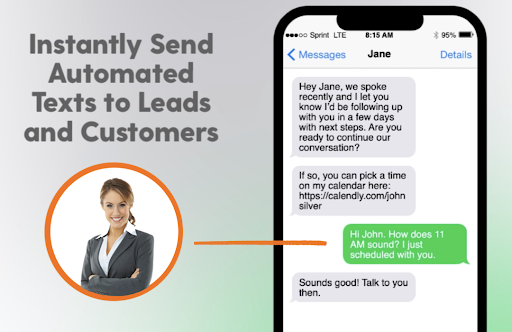
There are ready-to-use email templates for not creating an email design from scratch. Depending on your industry and email’s purpose, you can choose between email themes designed for more effective communication.
In SalesNexus, drip campaigns can be set for every customer touchpoint. In parallel, you can track all email statistics, such as open rate, clicks, unsubscribers, and more, to optimize your marketing strategy. The pricing includes all automated drip campaigns to help you make the most of your CRM.

Lastly, you can easily transfer incoming web leads into SalesNexus and nurture them through the sales funnel.
HubSpot and Salesforce basically come with the same features as SalesNexus when it comes to automated emailing. You can run automated email sequences on both platforms. Also, both provide advanced email tracking and notifications, so you can stay on top of your customer communications.
So, when choosing between HubSpot vs. Salesforce vs. SalesNexus, we would not recommend paying too much attention to the drip campaigns. You will be able to run all of them with the same efficiency level – with different UI and customizations, of course.
Customer Support
Well, a responsive customer support system via chat or email is available for all three. So, we recommend focusing more on premium support features and learning hubs.
As for SalesNexus, it has a free customer support system with 24/7 access via phone and chat. Plus, users get access to an extensive library of helpful articles and tutorials. You only have to pay more if you need a SalesNexus team of professionals to help you with specific customizations. For example, you can request developer engagement, assistance with services setup, database management, and other more complex tasks – each with its own price tag.
HubSpot competitors fall short here, as HubSpot has a very comprehensive learning hub available. It contains all the info about the platform – from basics to advanced tricks + an extensive library of marketing and sales-related materials. HubSpot Academy is basically more than a helping source for its users but is a powerful learning platform for a large public.

Salesforce comes with detailed tutorials depending on your business’s size and current growth stage. You can browse Success plan support materials if you’re just raising your business or dive into the professional services if you’re already an established business looking for scale. It also comes with peer and partner communities – a thing we love so much for experience sharing and collaboration.
Generally, Salesforce charges around 20% of your net contract price for 24/7 premier support. This percentage grows if you buy more seats and add-on features that require you to pay extra for the support.
